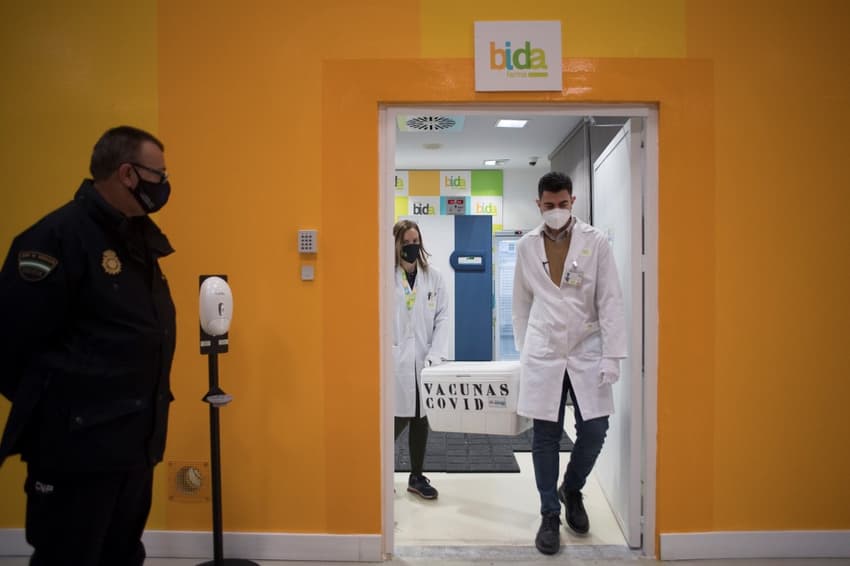ANALYSIS: How can Spain hope to beat coronavirus with 'vaccine wars' brewing?

Spain has pinned its hopes on an ambitious vaccination programme that is threatening to come off the rails as stocks run dry. Graham Keeley takes a look behind the politics to the situation on the ground.
Vaccine wars' makes a good headline, which has been taken up by almost every newspaper across Europe.
Dos de los diarios más sensacionalistas de Reino Unido recogen en portada sus impresiones sobre el retraso en el suministro de las dosis desarrolladas por AstraZeneca: "¡Esperad vuestro turno! La egoísta UE quiere nuestras vacunas" https://t.co/8mdIpCT8Zf
— EL MUNDO (@elmundoes) January 29, 2021
The reality is that it is an ugly business.
Has it really come to this? Sadly, it seems so.
As the row between the European Union and AstraZeneca rages on, Spain and other countries have reportedly turned their guns on Brussels, angered at the way it has handled the affair.
In a draft agenda for a meeting of regional health chiefs after COVID-19 cases have soared in Spain because of Christmas, Madrid criticised the EU, according to a report in El Mundo newspaper, which quoted the leaked document.
"It is the European Union that negotiates and signs the contracts, that is in charge of tracking them and making sure they are correctly fulfilled," it quoted the government as saying in the document.
Shortly after this report appeared, Spain's left-wing government - which is conspicuously pro-European - rebuffed the newspaper, pledging its support for the way the EU has handled the shortfall in vaccines.
Spain's foreign minister Arancha Gonzalez Laya told a press conference: "Spain fully trusts that the European Commission will know how to defend the interests of all member states, in terms of both vaccine acquisition and handling of contracts with pharmaceutical (companies)."
Behind the politics, however, the numbers tell the real story about what is happening on the ground.
Around Spain, regional health authorities have halted or slowed down vaccination programmes.
In Cantabria and Madrid, officials have stopped vaccinating new people to focus on administering second shots to those who have already received a first dose.
Josep Argimon, the secretary for public health in Catalonia, warned that the “refrigerators will be empty” by the end of the week because doses are running out.
Last week, regional governments only received 196,000 of the 350,000 doses they expected.
Problems with supply of the vaccines are perhaps not surprising.
The question, however, appears to be what does it mean for the country's ability to return to some sort of normality?
Salvador Illa, who was health minister until he handed over to Carolina Darias this week, said Spain hopes that it will vaccinate about 70 percent of the population by July.
Yet, if the problems with vaccine supplies continue, this appears a wildly optimistic plan.
Ignacio Aguado, the deputy president of Madrid regional government, said that at the present rate of vaccinations, only 10 percent of the population of the Spanish capital would get the jab by the end of July.
Data released on Wednesday showed Spain had administered about 1.4 million doses, about 78 percent of its current stocks.
With new shipments expected on February 15th, authorities around Spain hope that they can regain the momentum of the vaccine programme.
Of course, another factor in this equation is whether Spain has managed to flatten the curve of coronavirus infections which have been steadily rising since the festive season.
As I write, Spain recorded 34,899 new coronavirus infections and 515 deaths from COVID-19 on Thursday.
The same day, the 14-day incidence dropped slightly for the first time in three weeks to 889 cases per 100,000 people.
The cumulative total of infections is 2.7 million, with the death rate standing at 57,806.
Datos sobre #COVID19 en España, desde el primer caso inicial, actualizados a hoy jueves, 28 de enero:
▶️Confirmados por PCR: 2.705.001
▶️Fallecidos: 57.806
Información por CC.AA?https://t.co/bMYPqXp9f7 pic.twitter.com/StiuQ7UzzT
— Salud Pública (@SaludPublicaEs) January 28, 2021
Immunologists have said Spain missed the boat to bring in a full home lock down after a lax Christmas sent coronavirus cases rising; tougher restrictions are needed to slow the pace of the pandemic in Spain.
Valencia, the worst hit in Spain with a two-week incidence standing at 1,438 per 100,000 people on Thursday according to health data, has ordered the closure of cities including Valencia, Alicante, Torrevieja, Elche, Gandia, Benidorm and Orihuela among others from 3pm on Friday until 6am on Monday.
Other regions are following suit.
However, in perhaps the most worrying development, analysts have warned that as the vaccine roll out slows, new variants of COVID-19 may render the jabs we are receiving now less useful than we hoped.
The South African variant has been detected in Galicia, northern Spain, health authorities said.
Madrid reports that about 20% of cases in the city are from the so-called British variant.
This was supposed to be the year when everything got much better.

Graham Keeley is a Spain-based freelance journalist who covered the country for The Times from 2008 to 2019. Follow him on Twitter @grahamkeeley .
READ ALSO:
Comments (1)
See Also
Vaccine wars' makes a good headline, which has been taken up by almost every newspaper across Europe.
Dos de los diarios más sensacionalistas de Reino Unido recogen en portada sus impresiones sobre el retraso en el suministro de las dosis desarrolladas por AstraZeneca: "¡Esperad vuestro turno! La egoísta UE quiere nuestras vacunas" https://t.co/8mdIpCT8Zf
— EL MUNDO (@elmundoes) January 29, 2021
The reality is that it is an ugly business.
Has it really come to this? Sadly, it seems so.
As the row between the European Union and AstraZeneca rages on, Spain and other countries have reportedly turned their guns on Brussels, angered at the way it has handled the affair.
In a draft agenda for a meeting of regional health chiefs after COVID-19 cases have soared in Spain because of Christmas, Madrid criticised the EU, according to a report in El Mundo newspaper, which quoted the leaked document.
"It is the European Union that negotiates and signs the contracts, that is in charge of tracking them and making sure they are correctly fulfilled," it quoted the government as saying in the document.
Shortly after this report appeared, Spain's left-wing government - which is conspicuously pro-European - rebuffed the newspaper, pledging its support for the way the EU has handled the shortfall in vaccines.
Spain's foreign minister Arancha Gonzalez Laya told a press conference: "Spain fully trusts that the European Commission will know how to defend the interests of all member states, in terms of both vaccine acquisition and handling of contracts with pharmaceutical (companies)."
Behind the politics, however, the numbers tell the real story about what is happening on the ground.
Around Spain, regional health authorities have halted or slowed down vaccination programmes.
In Cantabria and Madrid, officials have stopped vaccinating new people to focus on administering second shots to those who have already received a first dose.
Josep Argimon, the secretary for public health in Catalonia, warned that the “refrigerators will be empty” by the end of the week because doses are running out.
Last week, regional governments only received 196,000 of the 350,000 doses they expected.
Problems with supply of the vaccines are perhaps not surprising.
The question, however, appears to be what does it mean for the country's ability to return to some sort of normality?
Salvador Illa, who was health minister until he handed over to Carolina Darias this week, said Spain hopes that it will vaccinate about 70 percent of the population by July.
Yet, if the problems with vaccine supplies continue, this appears a wildly optimistic plan.
Ignacio Aguado, the deputy president of Madrid regional government, said that at the present rate of vaccinations, only 10 percent of the population of the Spanish capital would get the jab by the end of July.
Data released on Wednesday showed Spain had administered about 1.4 million doses, about 78 percent of its current stocks.
With new shipments expected on February 15th, authorities around Spain hope that they can regain the momentum of the vaccine programme.
Of course, another factor in this equation is whether Spain has managed to flatten the curve of coronavirus infections which have been steadily rising since the festive season.
As I write, Spain recorded 34,899 new coronavirus infections and 515 deaths from COVID-19 on Thursday.
The same day, the 14-day incidence dropped slightly for the first time in three weeks to 889 cases per 100,000 people.
The cumulative total of infections is 2.7 million, with the death rate standing at 57,806.
Datos sobre #COVID19 en España, desde el primer caso inicial, actualizados a hoy jueves, 28 de enero:
— Salud Pública (@SaludPublicaEs) January 28, 2021
▶️Confirmados por PCR: 2.705.001
▶️Fallecidos: 57.806
Información por CC.AA?https://t.co/bMYPqXp9f7 pic.twitter.com/StiuQ7UzzT
Immunologists have said Spain missed the boat to bring in a full home lock down after a lax Christmas sent coronavirus cases rising; tougher restrictions are needed to slow the pace of the pandemic in Spain.
Valencia, the worst hit in Spain with a two-week incidence standing at 1,438 per 100,000 people on Thursday according to health data, has ordered the closure of cities including Valencia, Alicante, Torrevieja, Elche, Gandia, Benidorm and Orihuela among others from 3pm on Friday until 6am on Monday.
Other regions are following suit.
However, in perhaps the most worrying development, analysts have warned that as the vaccine roll out slows, new variants of COVID-19 may render the jabs we are receiving now less useful than we hoped.
The South African variant has been detected in Galicia, northern Spain, health authorities said.
Madrid reports that about 20% of cases in the city are from the so-called British variant.
This was supposed to be the year when everything got much better.

Graham Keeley is a Spain-based freelance journalist who covered the country for The Times from 2008 to 2019. Follow him on Twitter @grahamkeeley .
READ ALSO:
Join the conversation in our comments section below. Share your own views and experience and if you have a question or suggestion for our journalists then email us at [email protected].
Please keep comments civil, constructive and on topic – and make sure to read our terms of use before getting involved.
Please log in here to leave a comment.